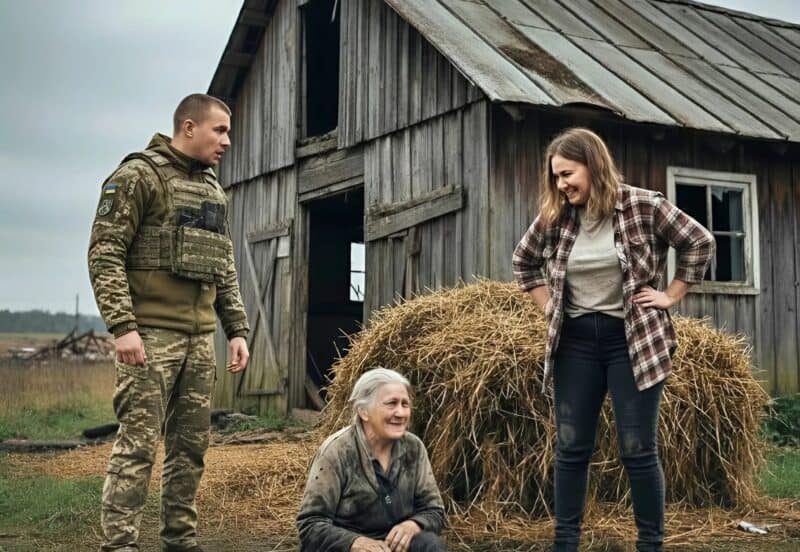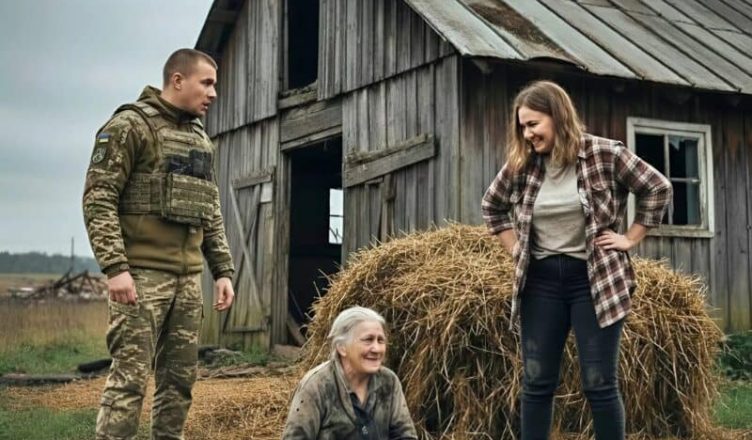He stared at her.
“What are you talking about?”
She clutched the phone against her chest like a shield.
“You weren’t here. You didn’t hear her. She acted like this house was hers alone. She opened drawers, searched our closets, examined the groceries, inspected my clothes. Every day she told me I wasn’t worthy of you — that a ‘soldier of honor’ deserved a real woman, not some cheap nobody.”
His temples throbbed. He remembered his mother’s steady voice on the phone:
“We’re fine here, son. Take care of yourself, don’t worry about us.”
Not one complaint. Not one hint of hostility.
“And that justifies locking her in a shed?” he asked, stepping closer. “For words?”

“You don’t understand…” she backed away. “At first I simply asked her to respect boundaries. But she would enter our bedroom without knocking. She rearranged things. At night she’d stand by the bed and watch us sleep. Whispering that you would leave me one day — for someone ‘proper.’”
Her eyes shimmered — with hurt, or resentment, or both.
“She was pushing me out of your life.”
He remembered his mother’s whisper before his last deployment:
“Don’t leave her alone. She’s young, scared, insecure.”
No anger. No contempt.
“When did this even start?” he asked quietly.
She lowered her gaze.
“The day you left. She said this house was hers, and that I was temporary.”
“And you believed her?”
“She kept repeating it… every day. She looked at me like I was dirt.”
He tried to find logic in her reasoning, some shard of truth — but he kept seeing his mother’s bruised wrists and that bowl of moldy porridge.
“Even if everything you’re saying is true,” he whispered, “even if every word from her was sharp and cruel…”
He met her eyes.
“It still doesn’t give you the right to treat her like an animal.”
She inhaled sharply:
“It wasn’t like that at the beginning. She said she preferred the fresh air outside. That she was used to rough living. I thought it might help everyone calm down.”
He thought of the shed — cold, unheated, no bed, just a pile of blankets.
“A bed?” he echoed slowly. “There wasn’t even a mattress.”
She waved her hand nervously.
“Then things escalated. She screamed when I tried bringing her inside. Said I stole her son. She once shoved me and called me ‘nothing.’”
He took another step toward her, voice tightening:
“Then why the rope marks on her wrists?”
Silence spread through the room.
“Tell me the truth,” he said softly. “Now.”
Her voice cracked:
“I was afraid of her. Afraid she’d push me out of this house. She already took your pay card ‘to manage savings.’ Forced me to sign papers so she’d control all the spending. She said a ‘real woman’ handles the money.”
Her hands trembled.
“She threatened to expose me to you…”
His heart clenched.
“Expose what?”
And then — the blow:
“That there was no baby.”
He felt the air drain from his lungs.
“What baby?”
She sat heavily on a chair.
“The one I told you about. Before your last deployment. I said I was pregnant. You remember.”
He remembered — holding his phone in a trench with shaking hands, filled with hope.
“I lied,” she whispered. “I was terrified you would slip away… that the war would change you… that I wouldn’t matter anymore. I thought if there was a baby — you would keep thinking of me.”
Inside him, everything turned.
“You lied about the pregnancy… and she found out?”
She nodded weakly.
“She found the test. The messages. She confronted me — called me a liar, a fraud, a disgrace — and promised to tell you.”
Two women now stood in his memory — both flawed, both human — but only one of them had been bound and locked in the cold.
“So you gagged her truth?” he asked quietly. “You imprisoned her to protect your lie?”
Her voice came out strangled:
“It wasn’t supposed to go that far! At first I brought her food, blankets… but she started yelling for the neighbors. Tried running to the gate. Tried calling someone. I panicked. I pushed her. She fell. I tied her wrists… just to stop her.”
He closed his eyes — seeing his mother in two versions:
the protector of his childhood
and the prisoner in the shed.
He opened them again:
“You could’ve told me. You could’ve asked for help. You could’ve suggested moving her elsewhere. Instead you chose to torture an old woman while I was out fighting to survive.”
She whispered:
“I was afraid you would choose her over me.”
That was the truth — simple, selfish, devastating.
“And now I see who you chose,” he replied. “You chose yourself.”
He left the room. No anger. Just finality.
In the shed, his mother tried to smile through her pain.
“Don’t be too hard on her, son… I wasn’t gentle either. I interfered. I judged. I thought I knew best. She’s young. She felt threatened.”
He held her hands.
“No one deserves this. Not for words. Not for pride. Not for mistakes.”
She looked at him with quiet understanding.
“What matters is that you
